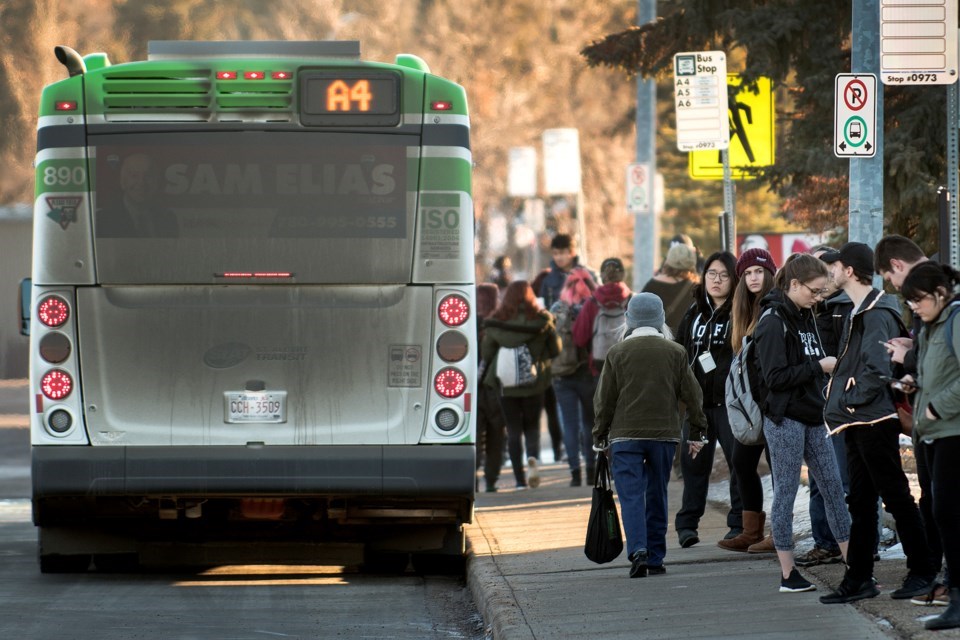St. Albert council directed city administration to hire a consultant to complete a financial analysis and implementation plan to bring public transit operations in-house, a potential first step in ending the city's practice of outsourcing transit services.
Coun. Sheena Hughes said she thought the city could save money by ending its contract with private service provider PW Transit.
“Upon review of the contract with [PW Transit], and after doing calculations on how much it would cost to come in-house, I'm confident that we can do it for the same price that we're currently paying, or less,” Hughes said.
“And I think it could be substantially less.”
Since St. Albert Transit was created in 1986, the city has outsourced transit services to private companies. Under these contracts, including the current contract the city has with PW Transit, the city is responsible for purchasing and maintaining buses, planning routes, and determining service levels, while the company is responsible for hiring, training, and scheduling drivers, shift supervisors, and all necessary administrative work like payroll and dispatching.
The pending financial analysis and implementation plan stems from a successful motion brought forward by Hughes on Feb. 6.
The original motion Hughes brought forward sought to have the city bring transit services in-house without completing a financial business case beforehand. Hughes changed the motion after council discussed the situation in-camera for 30 minutes.
The city's current contract with PW Transit expires in 2028, and last year the city paid $8.6 million for transit services, city spokesperson Pamela Osborne said in an email.
During debate, Hughes said a financial analysis and implementation plan will provide council the necessary information to make an informed decision.
“What this now will let us do is have a complete picture of everything that's going to be involved if we were to implement it, how it will be implemented, and what will be the costs and what would be the risks and everything we have to consider,” she said. “We've never had that information.”
Hughes' motion also drew the support of the Alberta Federation of Labour (AFL), which represents 28 unions and more than 170,000 Albertans.
AFL president Gil McGowan told council prior to the vote his organization thinks bringing transit services in-house could save the city at least $1 million per year, especially by reducing the administrative costsPW Transit charges the city for.
“To put it very succinctly, the value of bringing it in-house is clear,” McGowan said, adding that the AFL thinks the $1 million figure is a “conservative” estimate.
“We were trying to be conservative and not overstate the case because we understand there is administrative costs that goes with a transition, but that's a minimum,” he said. “I'm not going tell you to rewrite the contract. I'm just saying just look at it, because on the face of it it looks like this is a no-brainer.”
However, the city's director of public operations, Tim Saunders, wrote in a report to council there are too many unanswered questions about what would be involved in bringing transit operations in-house for administration to immediately determine whether there are savings to be had.
“There are significant considerations and complexities with in-sourcing bus operations,” Saunders' report reads. “The known direct costs and unknown costs from the risks that require further evaluation, as well as the examination and consideration of analogous situations of various regional partners, do not provide a clear indicator of savings.”
Hughes' motion, which gives administration a $100,000 budget to work with, passed with Mayor Cathy Heron and Coun. Natalie Joly opposed.
During debate, Heron said administration's recommendation against bring transit services in-house, as well as her concern there could be risks involved with the city ending its contract with PW Transit early, led her to not support the motion.
“One of the reasons I don't want to do it right now — a lot of it can't be discussed publicly — but the risks that we have been told of going down this path are high, very high,” she said. The proposal could also lead to delays and impacts on city projects that are more in line with council's strategic plan, she said.
Joly argued spending $100,000 wouldn't be worth it.
“I'm really tired of spending hundreds of thousands of taxpayer dollars on studies,” she said. “Our taxes are already expected to rise significantly over the next decade, so I just can't justify spending another $100,000 on a study.”
The motion gives administration until the end of March 2025 to present the analysis and implementation plan to council.




